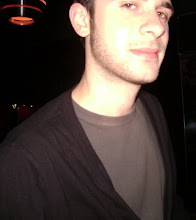**This is the last segment of my 3-part interview series on masculinity. This will also be my last masculinity themed post for a little bit so I can focus on other areas.
For this last interview, I wanted to see how masculine representation affected my friend Stu. Theories aside, I wanted to delve into my friend's mind and see his impressions on masculine representation and who came to mind in pop culture.
Unlike the interviews with Gauge and Paul, who both had differing ideas on masculinity, it is apparent with Stu's answers that he is still questioning norms. But what is most interesting is that he is not overly concerned with typical representations and seemingly identifies more with alternative portrayals.
Now without further ado... meet Stu.
Growing up, do you remember seeing on television or in films, any male figures who do not fit the normative depiction? How did you feel about them then? Now?

"A film I can clearly remember is Julien-Donkey Boy. The main character, Julien, played by Ewen Bremner, is depicted in such a disgusting and realistic fashion that most leads in Hollywood would run from and consider career suicide. You would NOT see Brad Pitt playing this role.
The film opens up with Ewen staring into the camera with drool dripping down his face and snot dripping out his nose. He is not a handsome man on any scale, somewhat losing his hair. At the time, I thought to myself that it had to have been one of the most disgusting and irrational things an actor could do on screen.
Today, my view of the world is definitely more mature and Ewen wanted to make a point that you don’t have to be the typical male that fits in the norm to be accepted."

As a teenager, what sort of male representations did you see in pop culture? How did they affect you?
"Having figured out I was gay at a younger age, I realized that gay issues were still quite new to television. Shows like Queer as Folk and Will and Grace opened up my eyes to seeing distinct representations of homosexual life in different, mainly positive, scenarios.
On the other hand, there were many shows out there that were all about the macho man. You know, the jock, popular straight guy dealing with girlfriends, cheating, friends, and then dealing with the one gay character on the show. Dawson’s Creek or Degrassi: The Next Generation come to mind.

It is tough to pinpoint how exactly each character and how they represented themselves affect me. On the one hand, if a gay character became popular or there was no change in how everyone around them acted once they came out, it made me think that it was possible that it will happen to me down the line as I had not publicly come out.
On the other hand, for example, many shows would show gay bashing, or that straight guys who are successful in one area and have issues would usually find a way out of [their issues]. This would downplay the gay guy's issues.
In Dawson’s Creek, the gay guy was always depressed, which would send a mixed signal of how life is. There was no middle ground. Male representation was on either ends of the extreme."

How do you feel male stereotypes brought in from pop culture affect you in your day-to-day life?
"I don’t really base my life around the stereotypes I see on T.V. As unoriginal as this may sound, but I like to consider myself original. There is no way that, to a certain degree, I am influenced by images and ideas that I am exposed to from the shows/films I watch and the music I listen to.
I guess that the male stereotypes would affect me in the way that I tend to try and avoid them. I think they are generalized and can be an illusion as to the way society would like to view the typical male."
Looking at Stu's answers, it becomes apparent that a part of his masculinity is about rebellion and of independence. For Stu, the alternative media (such as Harmony Korine) provides a sort of respite from typical depictions.

1 comment:
I also discovered that a lot of young men are scared shitless — of women, themselves and their future; that, contrary to our cultural imaginings, they are just as desperate to figure things out as young women. I found that a lot of the pains in the relationships of us 20-somethings can be blamed on cultural prescriptions for masculinity. Yes, there is the stud-slut double standard — but there’s also an expectation that men, unlike women, will not seek safe harbor in a relationship. No, they are supposed to bravely sail their ships beyond the singing sirens and silted waters of their quarter life until they miraculously hit land in the Real Adult World.
Post a Comment